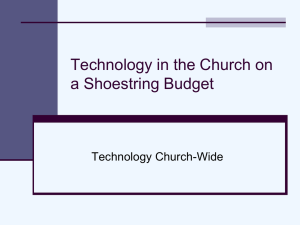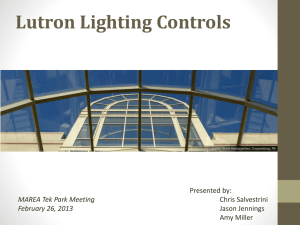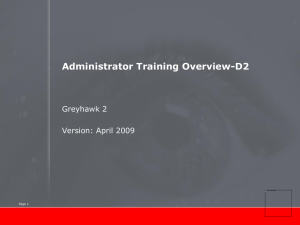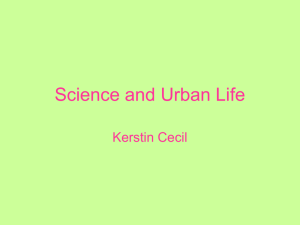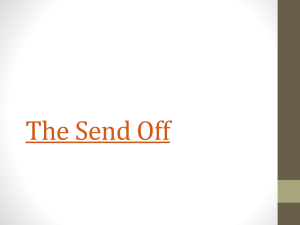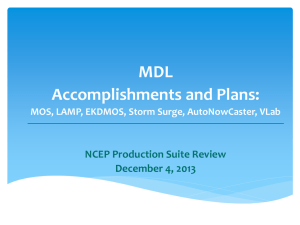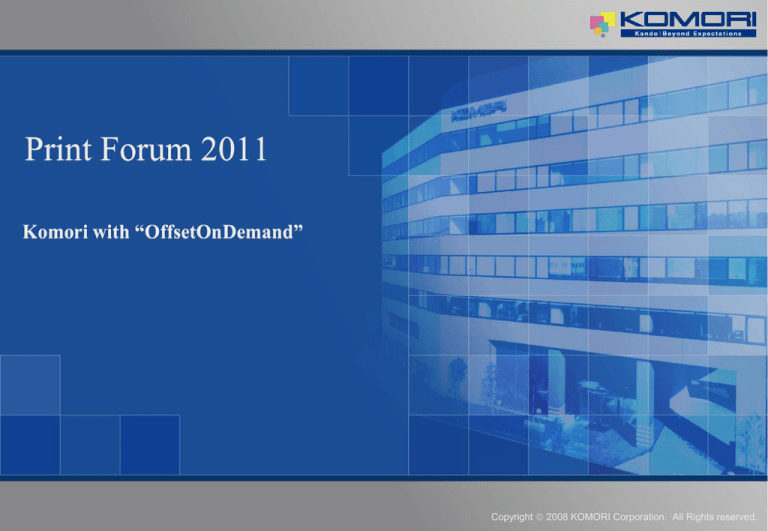
Print Forum 2011
Komori with “OffsetOnDemand”
Copyright 2008 KOMORI Corporation. All Rights reserved.
Todays topics
Komori Introduction
KHS-AI
H-UV
OffsetOnDemand
2
Komori Introduction
For more than 80 years, since 1923, the Komori Group has been producing
offset printing presses.
Employees : 2,471 persons
Main products:
Sheet-fed
Web-fed
Komori Chambon
Currency and Security Printing Presses
Komori CZ Office
3
Innovative
Latest Technology to improve profitability and respect the environment
KHS-AI + H-UV = OffsetOnDemand
4
KHS-AI
Latest Technology to improve profitability and respect the environment
Copyright 2008 KOMORI Corporation. All Rights reserved.
KHS-AI
Today's issues in the press room
Standardize printing procedure
Digitize print quality control
Reduce waste
Reduce lost time between jobs
KHS-AI Concept
Standardize the colour matching operation
No waste sheets used for color matching
Reduce make-ready sheets to 20-30 sheets
Get standard density within 20 sheets
Limit density change on the run
6
KHS-AI
Fast Print start - Instant colour and register
Pre-Inking - Auto learning
Smart Feedback – Density change without paper
Register Preset - Auto learning
Air Preset - Self learning
Smart Sequence – Automatic job change
7
KHS-AI
The Intelligent Way to Increase Profitability
Productivity with unparalleled performance
Lasting performance over press lifetime
Automatic Intelligence for smarter production
Future proof application
Cost savings on:
Paper
Time
Inks
Chemicals
Electricity
Lower cost of production than any similar machine
Fast return on investment
8
KHS-AI - Cost Advantages
KHS-AI reduces start-up paper waste by about 80%
KHS-AI saves 30 tons of paper a year per machine
KHS-AI intelligent pre-setting reduces lost production time
KHS AI increases productivity, reduces chemical waste
KHS-AI saves electricity
KHS-AI reduces ink consumption by 30 to 35 %
KHS-AI is a Komori Patent, there is no equal in the industry
9
KHS-AI - Pre-Inking
The self-learning function creates an automatic compensation curve
corresponding to the changes in conditions.
Ink profile added
Basic Ink film formed
Key
Opening
Pre-Inking 2
Key
Opening
% of image
% of image
10
KHS-AI - Pre-Inking
Key Opening
The compensation curve will change automatically after
pushing the update button. Inking, register, press pre-setting
are more accurate as conditions change.
Update
% of image
11
KHS-AI - Job Change Control
1. De-inking rollers
1-a.(Ink roller cleaning)
2. Blanket Cleaning
2-a.(Impression cylinder cleaning)
All these procedures
can be handled
automatically by…
3.Plate Changing
4.Pre-Inking
5.High speed start up
KHS-AI
"Smart Sequence"
6. Run 30 sheets and wait for OK
12
High Speed Start-up
High Speed Start-up at 12,000 sph
Time to reach 30th copy
Sheets required for Stable Density
Sheets required Stable Register
Approx. 40% Saving
Approx. 60% Saving
Approx. 60% Saving
13
KHS-AI - Cost Reduction Effect on an LS 29
What If you could reduce just 100 sheets waste per job ?…
Case 1: 1 day operation, complete 30 jobs…
100 Sheets of 135 gsm paper = 5.5kg x 30jobs x $1.50per kg = $247 cost saving per day
Case 2: 25 days operation per month
$247 x 25 working days = $6,175 cost saving per month
Case 3: 5 years operation using KHS-AI
$6,175 x 60 months = $370,500 in 5 years
+ Power savings (about $300 per month) x 60 = $18,000 in 5 years
Total Saving over 5 Years in Paper and Power = about $388,000
+ Ink & Chemicals savings over 5 years (± $7,000)
KHS-AI can easily save you $395,500 in 5 years
14
Komori Technology improves the environment and your profitability at the same time
1 tree produces 3 tons of dry wood (2.5 tons of paper)
3 tons of wood makes 37,500 sheets of 40" size coated paper
In 1 year a 40" press uses 533 trees (avg. 20million sheets)
Average total waste paper is 5% (26 trees)
Average start-up waste on a standard press is 200 sheets
When we use KHS-AI we can save 160 sheets per start-up
Even at only 10 jobs per day you will save 400,000 sheets
(25 tons of paper) or ten trees per year when you use KHS-AI
15
Komori H-UV
Brand new
Copyright 2008 KOMORI Corporation. All Rights reserved.
Drying systems used in offset printing
Sheet-fed machines
Oxydation: Ink is dried by atmospheric oxygen.
IR: Uses expensive IR heat to accelerate oxydation drying
Classic UV: Mercury UV light causes photo-polymerisation to cure the ink
LED-UV: Special LED-UV light causes photo-polymerisation to cure the ink
17
Oxydation drying – good points and bad points
Good points
Most common system, easily understood.
Cost it is low compared to other drying systems
Bad points
Lost time waiting for drying.
Factory floor space needed for drying paper.
Reverse side scratching if drying is not complete.
Need to use troublesome spray powder.
Need to use small stacks on difficult materials/jobs
18
UV Drying - good points and bad points
Good points
Instant drying
No need for floor space for drying paper.
Easy to turn over and print reverse side
No spray powder so clean press environment
Small stacks not necessary
Bad points
Installation cost and running cost are high
Because heat and ozone occurs, rust-proofing and ducting is needed
Odour and taint problems can happen
19
Principle of UV curing system
Classic UV lamp
Ultraviolet rays between 200-600nm are output.
254nm wavelength generates ozone,
Wave length above 400nm generates heat.
Classic UV ink
Using a photo initiator with 220nm-580nm reactivity
LED lamp
Wave lengths of 365nm, 385nm and 395nm are possible.
Manufacturers currently prefer 385nm and 395nm
LED-UV ink
Current photo initiator wavelength 385nm
20
490-500
480-490
Electromagnetic
wave and x-ray
470-480
780nm
460-470
450-460
440-450
430-440
Visible
Light
420-430
400nm
410-420
400-410
390-400
380-390
370-380
360-370
350-360
340-350
Ultraviol
et
330-340
320-330
310-320
300-310
290-300
280-290
10nm
270-280
260-270
250-260
240-250
230-240
High energy
220-230
210-220
200-210
UV Power %
UV light emitted by Classic UV
Radio wave
1mm
Infra-red
Low energy
120
Classic UV
100
80
60
40
20
0
Wavelength nm
Copyright - eye graphics
21
Merits of LED-UV
LED life at least 15 times more than classic UV lamp
Classic UV lamp nominal 1,000 hours, LED 15,000 hours
LED power consumption approx. 20% of classic UV
Heat generation is low, machine stays cool
Plastic and other difficult substrates have no register problems
Instantaneous on/off
Classic UV start-up 1 minute, cool down 4 minutes
22
Wavelength - nm
490-500
480-490
470-480
460-470
Ozone
occurrence
wave length
450-460
254nm
440-450
100
430-440
420-430
410-420
400-410
390-400
380-390
370-380
360-370
350-360
340-350
330-340
320-330
310-320
300-310
290-300
280-290
270-280
260-270
250-260
60
240-250
230-240
220-230
210-220
200-210
output %
UV light emitted by LED-UV
120
Classic UV
LED-UV
80
Heat
generation
40
20
0
As for wave length eye
graphics make
23
LED-UV tests in Tsukuba
24
Problems of LED-UV
Distance between lamp and substrate +/- 20mm
Lamp housing less than 15mm causes problems with carton.
Must be positioned over a cylinder to be close enough.
UV coating not yet available
LED wavelength (385nm) causes coatings to “yellow”
LED lamp cost very high (+/- $200,000 for 1 lamp on 29”)
LED lamp life is long, but exchange cost is high ($100,000?).
25
The Hybrid UV system proposed by Komori
A system which can cure LED-UV ink using just one ozone-free UV lamp
LED
LED
LED
LED
Yell
Mag
Cyan
Black
Ozone less UV lamp
26
Hybrid UV performance tests in Tsukuba
4 lamps on, 16,000sph printing
3 lamps on, 16,000sph printing
2 lamps on, 16,000sph printing
1 lamps on, 16,000sph printing
OK
OK
OK
OK
1 lamp at 50% power, 16,000sph printing OK
27
wavelength nm
490-500
480-490
470-480
460-470
450-460
440-450
100
430-440
420-430
410-420
400-410
390-400
380-390
370-380
360-370
350-360
340-350
330-340
320-330
310-320
300-310
290-300
40
Ozone
occurrence
wave length
280-290
60
254nm
270-280
260-270
250-260
240-250
230-240
220-230
210-220
200-210
UV output %
UV spectrum comparison of Komori Hyper UV
120
Classic UV
LED-UV
Hybrid UV
80
Calorificatio
n territory
20
0
As for wave length eye
graphics make
28
Advantages of Komori Hyper UV system
Reduced initial cost (opposite of LED-UV)
Less than half price of LED-UV
Reduced lifetime cost of UV lamp (opposite LED-UV)
Lamp life is shorter than LED-UV lamp but exchange cost is cheap,
Power consumption same as LED-UV plus compact power source
Hyper UV15.8kw (lamp 10.2kw and water cooling 4.6kw on 32”).
Heat generation is low
Dryer area + 4-5°
Ozone free
Ozone generation wavelength (254nm) is cut.
Easy to print carton board
Distance between lamp and substrate same as classic UV
Environmentally friendly printing
LED ink has no VOCs
No need for heat blower
Reduction of CO2 emission
29
Development concept of Hyper UV
Komori investigated the best solution to printers in both price and
technology wise at this stage, we would like to contribute benefit to printers
Installation and running cost is low, allowing UV development into
commercial printing.
Cost advantages between lamp life and exchange cost.
Overcomes a major defects with LED-UV, UV coating, no scratching on
carton.
30
H-UV Profitability - compared to Conventional printing
Considering a 30% productivity increase
LS-440 (conventional)
Number of
operating days
Actual operating
time
288 days
11.5 hours
Remarks
Remarks
LS-440 (H-UV)
Per year
Number of
operating days
12 hour working
Actual operating
time
288 days
11.5 hours
Per year
12 hour working
Average run
3,000 sheets
Per job
Average run
3,000 sheets
Per job
Production
quantity
12.8 jobs
Per day
Production
quantity
16.6 jobs
Per day
Sales price
4,000 Yen
Per edition
Sales price
4,000 Yen
Per edition
Per colour /1 s
20% image
Ink cost
28 Yen
Ink cost
10 Yen
Electric power
92kw
Electric power
131kw
Lamp change
expense
0 Yen
Lamp change
expense
2.2 times change
1,500hr life
Annual profit
26,158,548 Yen
Annual profit
27,122,908 Yen
964,360 Gain
Per colour /1 s
20% image
31
H-UV Profitability - compared to Conventional printing
Considering Productivity + 20% and Sales Price +10%
LS-440 (conventional)
Number of
operating days
Actual operating
time
288 days
11.5 hours
Average run
3,000 sheets
Production
quantity
12.8 jobs
Sales price
4,000 Yen
Remarks
Remarks
LS-440 (H-UV)
Per year
Number of
operating days
12 hour working
Actual operating
time
288 days
11.5 hours
Per year
12 hour working
Average run
3,000 sheets
Per day
Production
quantity
15.3 jobs
Per day
Per edition
Sales price
4,400 Yen
Per edition
Per colour /1s
20% image
Ink generation
28 yen
131kw
Ink generation
10 yen
Electric power
92kw
Electric power
Lamp
consumption
expense
0 Yen
Lamp
consumption
expense
2.2 times change
per year
1,500hr life
Annual profit
26,158,548 Yen
Annual profit
30,291,281 Yen
4,132,733 gain
Per colour /1s
20% image
32
H-UV INKS
H-UV ink Supplied by TOYO worldwide
World-wide expansion with alternative ink suppliers
Price comparable to regular UV
Coverage 20% more than conventional ink
Better colour hold-out (no dry back)
Superior high gloss coatings
33
Summary
Classic UV
Expensive installation and high running cost
Produces ozone and heat (bad for m/c and environment)
LED-UV
Overcomes a few of the issues with classic UV printing
Expensive hardware, difficult to make a profit.
H-UV
New printing technology using H-UV lamp and H-UV ink
Lots of merit points compared with other UV processes.
Superior printing quality and lowest production costs
34
KHS-AI + H-UV, adding Twenty Matching
Copyright 2008 KOMORI Corporation. All Rights reserved.
Twenty Matching - System
A system which matches a press sheet to a proof within
20 sheets of start-up
No change in quality after 20th sheet
36
Twenty Matching – Target Segment
Commercial sector
Based on target density standards
Using international printing standards
Factory with environment control
H-UV or conventional process inks
37
And when we combine KHS-AI, H-UV and
Twenty Matching
We get !
38
39
Offset-On-Demand
New business model for offset printers
Competes with digital (Print On Demand)
Three 200 copy jobs in 15mins
Only 20 sheets waste (20 matching)
Instant finishing
40
Offset-On-Demand
Can be used on straight or perfecting m/c
Can be used with almost any substrate
More profitable than digital over 400sheets
Combined with near-line finishing equipment
Can be combined with web-to-print
41
Thank-you for your attention,
(See you soon for the demonstration)
42

